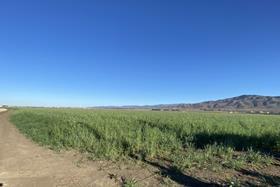
Braga Fresh, home of the Josie’s Organics brand, is to market a trial crop of regeneratively grown fresh vegetables for the first time. The crop is due to be harvested on Earth Day on April 22.
Regenerative agriculture is a variety of sustainable farming principles and techniques that seek to reverse climate change by rehabilitating soil organic matter and biodiversity.
The focus of regenerative farming on soil health promotes the natural cycle of building carbon content and nutrients in the soil to strengthen photosynthesis in plants for a more nutrient dense food.
Braga Fresh is in the second year of small-scale trial of regenerative crop practices on the company’s home ranch in Soledad, California, to understand the implications and identify the pieces of the concept that may be applied to current commercial fresh vegetable and leafy green farming.
The ultimate goal is to reduce the soil tillage now used by the fresh vegetable farming industry and apply any successes and learnings to the company’s other growing regions.
“The objective of our regenerative farming trials is to increase soil carbon and decrease consumption of diesel fuel that powers the tractors conducting the tillage operation,” said CEO Rodney Braga.
“Those changes would reduce our overall CO2 emissions aiding us in the goal of being carbon neutral by 2025.”
The first regenerative trial crop was planted in early 2021 under the supervision of Eric Morgan, vice president of environmental science and resources.
Cover crops, data management, companion plantings, crop rotation, intercropping, water management technology and soil testing are all tools and metrics used for the trials.
In April 2022 the company will harvest its third regeneratively grown trial crop which includes organic broccoli, organic red and green leaf and organic Iceberg lettuce.The vegetables will be packed and sold under the Josie’s Organics brand and meet GMP and LGMA standards.
Morgan commented: “Tillage operations currently employed by our industry weakens soil aggregate stability that leads to reductions of soil microorganisms that populate the soil microbiome.
“We believe that most common tillage practices utilised by the industry inadvertently increases crop water consumption and creates a need for excess fertiliser. Our overall intent with these regenerative crop trials is to confirm our hypothesis and feasibly overcome these farming challenges.”
Braga said while the company is in the early stages of trials and still has a lot to learn, taking the trial crops to market demonstrates its commitment to continuous learning and improvement.
“Soil health has long been a part of our farming programme; we have a robust soil testing programme that is key to our organic farming,” he said.
“Trialling regenerative practices will help us identify feasible low tillage practices for fresh vegetable production and still maintain the quality expectations of retailers and consumers.”



